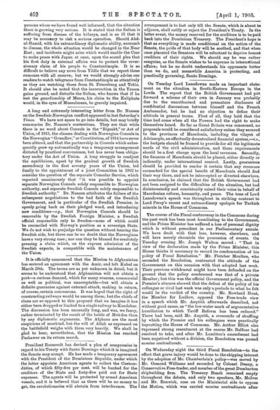On Triesday Lord Lansdowne made an important state:. merit on
the situation in South-Eastern Europe in the Lords. The report that the British Government had put forward a scheme -of their own in January was probably due to the unauthorised and premature disclosure of confidential discussions between himself and the French Ambassador, but he had no objection to define their attitude in general terms. First of all, they held that the time had come when all the Powers had the right to make themselves heard. So far as Great Britain was concerned, no proposals would be considered satisfactory unless they secured to the provinces of Macedonia, including the vilayet of Adrianople, an effectually decentralised financial system,—i.e., the budgets should be framed to provide for all the legitimate needs of the civil administration, and these requirements should be a first charge upon the local revenues. Secondly, the finances of Macedonia should be placed, either directly or indirectly, under international control. Lastly, guarantees should be provided to render it certain that any revenues earmarked for the special benefit of Macedonia should find their way there, and not be intercepted or diverted elsewhere. In conclusion, be claimed that the British Government had not been resigned to the difficulties of the situation, but had disinterestedly and consistently raised their voice in behalf of Macedonian reform, humanity, and peace. The .tone of Lord Lansdowne's speech was throughout in striking contrast to Lord Percy's recent and extraordinary apologia for Turkish misrule in the House of Commons.






































 Previous page
Previous page